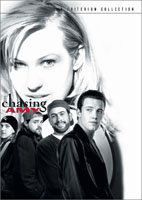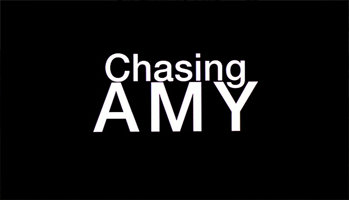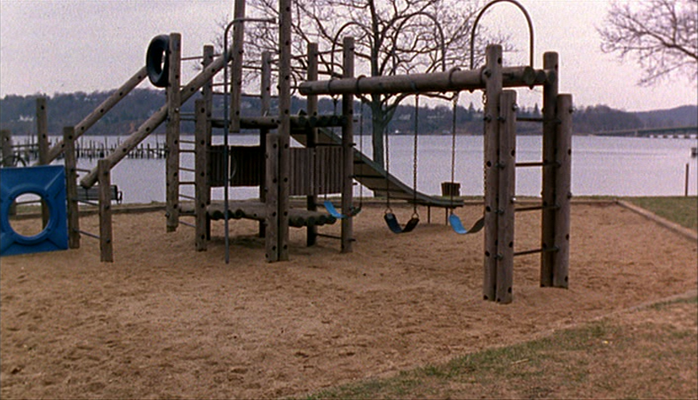2000: 

written and directed by Kevin Smith.
Criterion #75. Don’t ask why. It just is.
I saw Chasing Amy in the theater when it was new. In fact it was at a time when I was keeping a diary. Let’s check the log:
April 21, 1997
Monday…
In the evening, see “Chasing Amy” with [_____], [________], and [________]. It’s interesting, but not RIGHT.
There you have it. I stand by that review.
The redactees are three girls from high school. Not people I felt truly close with, but certainly all in the regular cast, at least for that season.
Tonight was my first time seeing the movie since April 21, 1997. It was all very familiar, which I suppose might be surprising given the ways that my memory has wobbled off center in the intervening years, but that was a sentimental time in my life and all social activity felt momentous, so it makes sense to me that impressions of a movie seen in 1997 under those circumstances are easily resurrected. The intermittences of the heart, and all. 6625 days.
What I specifically remembered about the movie, and was able to retaste as soon as the DVD started, was a certain feeling that was near-constant throughout high school (and much of life on either side, too): the sense that the underlying gag, the premise, the social deal, was being slightly but crucially lost on me — or was all a big lie — or both.
A very particular and much-practiced feeling for me, from adolescence on up.
There’s something so deep and strong and silent about a mode of compulsive joking that everyone in a room shares, like the cold undertow at the bottom of a river. The joking that defines the communal vibe, attitude, cool, but is never taught or named or questioned. Self-deprecatory joking, or self-aggrandizing joking, or sexual insinuation, or some non sequitur phrase that keeps getting thrown at the conversation like a Wacky Wallwalker. All with a proud smirk: (This is how we are. This is so very how we are.)
So much of my adolescence was spent in a state of calculation: my gut would tell me confidently that everyone’s communal joking was nervous, small, a house of sticks being rebuilt again and again. That what was going around as “funny” was so obviously unfunny, so obviously some other thing in denial. Meanwhile my shy brain would counter skeptically, reminding me that these people certainly didn’t seem to be nervous or needy or phony; they seemed to be having a good time, they seemed to be in their element. I was the one who was nervous; I was the one who was intimidated.
The choice was always between irritably putting my foot right in the punchbowl (“Guys, seriously, why do you all constantly keep saying that people are ‘pimps’ and ‘hos’? How is that funny? What does that have to do with anything?”) or curling up inside in frantic shame (“Why don’t I get it? Why are the concepts of ‘pimps’ and ‘hos’ still so arbitrary and foreign to me when they’re obviously such immediate sources of comfort and amusement to the happy people around me? Why am I so small and childlike that I don’t know how to share in any of this being alive, being worldly, being here?”)
Neither of these options led anywhere. And yet at the same time I was also deeply aware that exactly when this kind of alienating stuff was going on, that was when the people around me were coming close to sharing some of their feelings, their real feelings. And I wanted to be there when that happened.
I didn’t understand why they were so fixated on drinking, on getting away with drinking, on the exploits involved in getting away with drinking, on knowing and being knowing about drinking and about other people’s exploits relating to drinking, on and on — it was all a weird, dull obsession that had descended upon the minds and conversations of nearly everyone I knew… and yet I also knew that whenever they were drinking and talking about drinking and talking about talking about drinking, for all the false bravado and theatrics of it, they were also right on the threshold of being at their most open and real. Which I wanted to be around very badly. So I came to have a sense of eager nervousness when people started being smarmy: “if I can just make it through the initiation round of bullshit without them noticing my skepticism and/or my hopeless childishness, I’ll get to hear from them, really from them.”
That’s the complex of feelings that Chasing Amy reawakened. Instead of picking apart Kevin Smith’s stilted worldview with my adult mind, as I probably would if I were seeing it now for the first time, I let it wash over me as I did then, and felt that chilly undertow. I could hear again the comfortable laughter of [_], [_], and [_], the laughter of all my classmates — “ha ha, you’re so speaking our language, movie!” — as I just tried to hold my balance against wave after wave of other people’s premises.
I’m quite certain I don’t have Asperger’s Syndrome; what I have is “phobia of having Asperger’s Syndrome.” But in practice they’re not so different. Here is my mind, desperately chasing Amy through this movie, as through so much of life:
“Oh, so is this how people are with their friends? So is this how people joke and hang out? Oh, are bars like this where it’s cool to go? Is this what people seem like when they’re having a good time? Is it more funny when people say “fucking”? That’s funny, right? I thought so! I totally knew that!”
What I know now that I didn’t know then:
1) that my gut, as opposed to my anxious brain, is necessarily right, because for any individual, that’s the only real definition of “right.”
2) that seeing through other people’s phoniness and denial is a completely separate thing from being irritable about it, and I don’t have to give up the former just to avoid the consequences of the latter.
3) that irritability is my own phoniness and denial, just a form of fear.
Everyone has anxieties; everyone struggles against them; almost everyone makes the mistake of endorsing that struggle. But repression is, to quote Chasing Amy, “like a pair of goddamn Chinese finger cuffs.” The struggle is what maintains the trap. The jokes that get passed obsessively around the table like a magic joint are just the jokes that make each person feel a twinge of fear that he might be square, and want to prove otherwise. Thus the joke perpetuates itself. Subconscious anxiety — pride in the struggle — keeps that ball in the air indefinitely.
A typical laid-back night on the town in high school: “Oh yeah? Well, rest assured I can be cool too.” “Oh yeah? Well, rest assured I can be cool too.” “Oh yeah? Well, rest assured I can be cool too.” “Oh yeah? Well, rest assured I can be cool too.” “Oh yeah? Well, rest assured I can be cool too.” “Oh yeah? Well, rest assured I can be cool too.” “Oh yeah? Well, rest assured I can be cool too.” “Oh yeah? Well, rest assured I can be cool too.” “Oh yeah? Well, rest assured I can be cool too.” “Oh yeah? Well, rest assured I can be cool too.”
Just typing this is making me feel those high school feelings. (“They’re all saying the same exact thing over and over. This is surreal. Why am I the only one that notices? Should I point out to them that they’re all saying the same thing? Will they get mad at me if I do? Do they already know? Should I say it too? How do they all know to say it? Am I missing something? Are they really just saying that over and over or am I somehow imagining it? Why is this always so much harder for me than for everyone else?”)
The only way out of the finger cuffs is happiness, relaxation. And I was in no position to offer that to anyone. Or so I thought, which made it true. So they were all of them right: beer was indeed their best bet.
Chasing Amy is about how Kevin Smith couldn’t get over the fact that Joey Lauren Adams had more sexual experience, and generally life experience, than he did. It really upset him and made him angry and jealous. For 2/3 of the movie, it seems to be a story about whether a straight man and a lesbian can happen to fall in love. Fine. But then suddenly the Kevin Smith character (“Ben Affleck”) reveals that for all that he lives in a world of constant “I can be cool too” sexual innuendoes, he’s actually completely freaked out and hung up on the idea of sexual freedom, and this is the real conflict of the plot. As writer/director, Kevin Smith’s psychology gets him to the point where he understands that this is a problem, but not to the point where he understands that it’s his problem. It gets framed as a “guy thing,” or a “you know how it is, man,” thing. But I don’t know how it is. I think a lot of people don’t.
His bittersweet ending is a glorification of the struggle: “I’ve done a lot of soul searching and now, too late, I realize that I need to change…” But that’s not how people sound when they truly mature: they sound like the same person, just less upset. I wish I’d known that at the time. I too, sitting there in the movie theater wondering why I didn’t feel comfortable, was seeking hard-earned wisdom, self-improvement, self-development, when I should have just been seeking relaxation, grace.
At least three times in the movie, Kevin Smith has various characters say something about the narrowness of their moral framework to the effect of, “You know me, man, I was raised Catholic!” But to what end? To him it’s no different from Jersey pride. Questioning one’s outlook — “seriously, dude, think about it” — shedding a hard-earned tear for your mistakes, your jealousy, your closed-mindedness — to him it’s all just another part of the game, the game of being awesome, making awesome jokes, hanging out the awesome way, keeping it real, going to the hockey game, sharing a beer, quoting Star Wars, what can I say, I was raised Catholic. Rest assured.
What’s more Catholic than anticipating a hard-but-necessary cleansing from the grave errors inflicted upon you by Catholicism? What’s more Jersey than constantly recommitting to being proud, rather than ashamed, of Jersey? What’s more childish than going to the grown-ups-only bar and drinking grown-ups-only beer and playing grown-ups-only darts? What’s more provincial than making a movie about the way your mind was expanded when you dated someone who was less provincial?
The other day I wrote in my notepad of deep thoughts:
Recognizing that you’re a jerk can be what makes you a jerk.
I didn’t realize it at the time, but I was writing about Kevin Smith.
As a kid from Jersey, who was raised Catholic, and likes comic books, and gets uncomfortable thinking about the full breadth of life, he seems like probably a nice guy. Even a talented one. As someone who knows and names all that stuff about himself, and makes a movie that sheds a tear for it, he’s got nothing to offer me. I don’t want to watch someone bang his head against his own walls and then tell me to “think about it.” (Which I believe was the pitch for Dogma.)
The end credits have a long indulgent section of personalized shout-outs from him, Kevin Smith, to all the people who worked on the film (plus “GOD”), with an in-joke for every one, a quote-of-the-day, a noogie.
This is how we are. This is so very how we are.
The filmmaking is pedestrian and the world it creates is very thin, but I did find the movie basically watchable, which I credit to the onscreen ease of Jason Lee and, yes, Joey Lauren Adams. They seemed comfortable so I felt comfortable. Comfortable enough to watch, that is.
Given my memories, I expected to find myself downright angry this time around. But I wasn’t at all. I was glad to have a glimpse of my own past and perhaps my own future. The movie turned out to be a harmless prop in that process.
The disc announces “Screen-specific audio commentary…” which I read as “scene-specific” and took to mean “only for a few select scenes,” as it has on other discs. But I guess that’s copy held over from the laserdisc days, when people had to talk up the fact that the commentary would correspond to what was on the screen. It’s a full-length commentary. I basically enjoyed it. They’re really all sitting together and being themselves. You essentially get to hear the dorky, antsy bantering that makes up Kevin Smith’s real world and from which he wishfully extrapolates the “awesome bull session” dialogues that make up his screenplays.
Ben Affleck, visiting on a break from filming Criterion #40, makes a lot of compulsive jokes about his nervous vanity as a smokescreen for his nervous vanity; he seems like the kind of guy who would anxiously pressure his wife to issue a correction on his behalf when she went up on stage at the Oscars. Kevin Smith sounds just like Ben Affleck but seems calmer. The other guys put out a lot less personality, except for Jason Mewes (“Jay”), who is used to being treated as stoner mascot, somewhat less than human, and plays along accordingly.
There are also a bunch of deleted bits, and some dumb “hey hey hey here we are talking to you, purchasers of the Criterion laserdisc” video segments in the menus (and in the color bars), where Ben can be seen repeatedly licking his brand new teeth.
Kevin Smith also lures the Criterion producer on camera to embarrass her, which I appreciated, given that that’s why I’m here. Susan Arosteguy. She’s still there.
Connection to the preceding: Jay and Silent Bob are in both movies.
Okay, just kidding. This is a tough one.
A character reacts to seeing a couple sleeping together on someone else’s couch.
The music, by Dave Pirner of Soul Asylum, is about as perfect for a movie like this as it could be. I’m entirely serious. When I heard the main title music start up I sort of sat up in my seat and thought, “Wow, I immediately know where this is going to be, in space and time and in the heart. I’m immediately ready to give it a real shot.” I can’t imagine doing nearly as well by the movie if I’d been asked to come up with some music to set the tone.
That main title (called “Tube of Wonderful” when it was released on the Jay and Silent Bob Strike Back soundtrack) is our selection:
